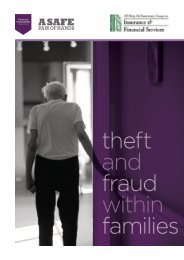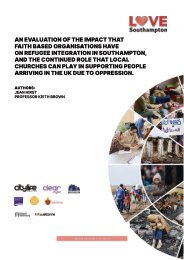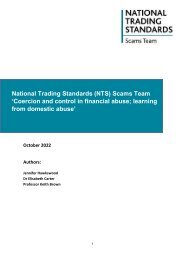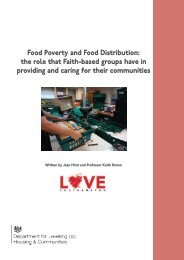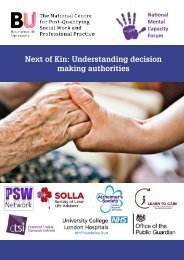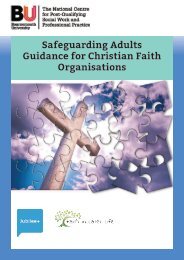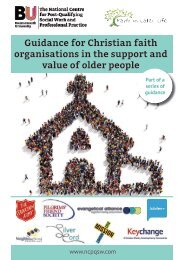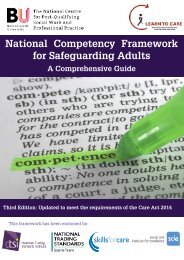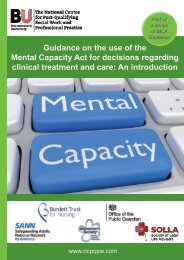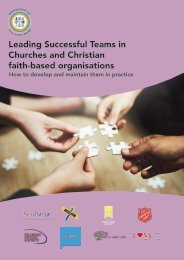Loneliness in Older People - Online
Some of the isolation and loneliness which people in the Fourth Age experience is due to the ageism in our society and in our churches. It is now time for churches to stand-up to the prejudices and discrimination of older people, to challenge the ageism we see in society and show that people in the Fourth Age are valued, celebrated, respected and included. Churches and Christian faith organisations should be leading the way to reach out to older people, to tackle ageist views and attitudes and demonstrate that older people matter.
Some of the isolation and loneliness which people in the Fourth Age experience is due to the ageism in our society and in our churches. It is now time for churches to stand-up to the
prejudices and discrimination of older people, to challenge the ageism we see in society and show that people in the Fourth Age are valued, celebrated, respected and included. Churches
and Christian faith organisations should be leading the way to reach out to older people, to tackle ageist views and attitudes and demonstrate that older people matter.
You also want an ePaper? Increase the reach of your titles
YUMPU automatically turns print PDFs into web optimized ePapers that Google loves.
Ageism <strong>in</strong> churches – Isolat<strong>in</strong>g and Exclud<strong>in</strong>g <strong>Older</strong> <strong>People</strong><br />
Ageism is a negative and destructive attitude to age<strong>in</strong>g and older people, and is the most<br />
commonly experienced form of prejudice (Age UK 2012). Unfortunately, ageism <strong>in</strong> society and<br />
<strong>in</strong> churches often goes unnoticed, unrecognised or unchallenged. Ageism reflects a lack of<br />
knowledge and understand<strong>in</strong>g of age<strong>in</strong>g and a fear of older age, lead<strong>in</strong>g to negative attitudes<br />
and discrim<strong>in</strong>ations aga<strong>in</strong>st older people. It affects how people view older people and their<br />
value <strong>in</strong> society; it also affects how older people see themselves, what they expect and how they<br />
view their place <strong>in</strong> society (Campaign to End <strong>Lonel<strong>in</strong>ess</strong> 2020).<br />
Ageist views discrim<strong>in</strong>ate aga<strong>in</strong>st those liv<strong>in</strong>g <strong>in</strong> the Fourth Age, suggest<strong>in</strong>g that age<strong>in</strong>g is<br />
someth<strong>in</strong>g to avoid at all costs. Such views devalue and dismiss the contribution of elders and<br />
focus on the new, updated, modern and young. Ageism and age discrim<strong>in</strong>ation manifests <strong>in</strong> the<br />
lack of resources, services and policies to support older people with<strong>in</strong> the community and <strong>in</strong><br />
society. Despite the Equality Act (2010) mak<strong>in</strong>g it illegal to discrim<strong>in</strong>ate on the basis of age, older<br />
people often experience prejudice from society, communities, churches and families, due to<br />
<strong>in</strong>herent ageist views and attitudes.<br />
“Churches and Christian faith organisations can have policies,<br />
services and practices which discrim<strong>in</strong>ate aga<strong>in</strong>st older people,<br />
without be<strong>in</strong>g explicitly ageist”<br />
The impact of <strong>in</strong>stitutional ageism, seen <strong>in</strong> society today, is that the needs of older people can<br />
be overlooked. Ageism experienced by people liv<strong>in</strong>g <strong>in</strong> the Fourth Age is often due to a lack<br />
of knowledge and understand<strong>in</strong>g, rather than <strong>in</strong>tentional discrim<strong>in</strong>ation – lead<strong>in</strong>g to some<br />
older people feel<strong>in</strong>g excluded, abandoned and disregarded. Churches and Christian faith<br />
organisations can have policies, services and practices which un<strong>in</strong>tentionally discrim<strong>in</strong>ate<br />
aga<strong>in</strong>st older people, without be<strong>in</strong>g explicitly ageist – simply by exclud<strong>in</strong>g older people, not<br />
enabl<strong>in</strong>g them to access services or mak<strong>in</strong>g them feel disregarded and ignored. Because it is<br />
so negative, exclud<strong>in</strong>g and discrim<strong>in</strong>atory, ageism can itself lead to a predicted and <strong>in</strong>evitable<br />
lonel<strong>in</strong>ess <strong>in</strong> old age. Ageism which has been built-<strong>in</strong> to society’s views leads to a ‘self-fulfill<strong>in</strong>g<br />
prophecy’ of lonel<strong>in</strong>ess, as people view lonel<strong>in</strong>ess as an <strong>in</strong>evitable part of gett<strong>in</strong>g older and<br />
experience much higher levels of isolation and lonel<strong>in</strong>ess <strong>in</strong> the Fourth Age.<br />
Despite most churches hav<strong>in</strong>g decl<strong>in</strong><strong>in</strong>g numbers and age<strong>in</strong>g memberships, very few have<br />
specific m<strong>in</strong>istries, leadership or missions <strong>in</strong>volv<strong>in</strong>g or among older people. Rohr (2012)<br />
suggested that many churches have a ‘first-half-of-life’ culture, where the focus of m<strong>in</strong>istry is on<br />
children and families, with the contributions and needs of elders be<strong>in</strong>g un<strong>in</strong>tentionally ignored.<br />
In particular, there is little focus on those <strong>in</strong> the Fourth Age – the ‘forgotten faithful’, who may<br />
not be able to attend church services, events or groups; whose spiritual and pastoral needs may<br />
go unnoticed or unfulfilled <strong>in</strong> some churches; who may have enormous amounts of knowledge,<br />
experience and wisdom but few opportunities to share or use these <strong>in</strong> m<strong>in</strong>istry or mission. It<br />
is <strong>in</strong>terest<strong>in</strong>g to note that churches who hold Family services often focus these on the needs<br />
of children and youth members, omitt<strong>in</strong>g to consider the older members of grandparents and<br />
great-grandparents – this is one example of the churches’ un<strong>in</strong>tentional ageism which over the<br />
years has excluded and ignored those liv<strong>in</strong>g <strong>in</strong> the Fourth Age.<br />
13 | <strong>Lonel<strong>in</strong>ess</strong> <strong>in</strong> <strong>Older</strong> <strong>People</strong>






